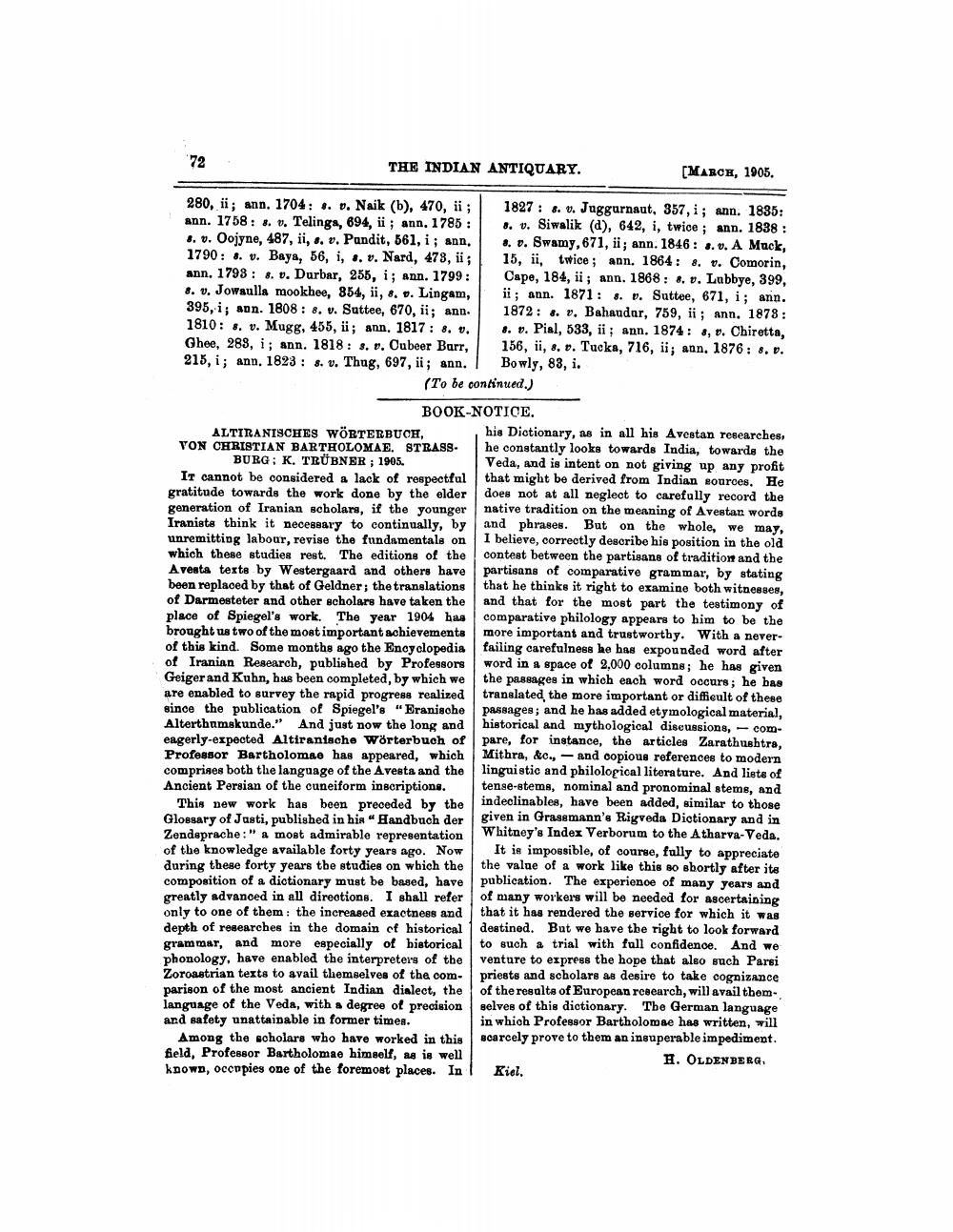________________
72
THE INDIAN ANTIQUARY.
[MARCH, 1905.
280, ii; ann. 1704: $. v. Naik (b), 470, ii; 1827 : «. v. Juggurnaut, 357, i; ann. 1835: ann. 1758: 4. v. Telinga, 694, ii; ann. 1785 : 8. v. Siwalik (a), 642, i, twice ; ann. 1838:
. v. Oojyne, 487, ii, ., v. Pandit, 561, i ; ann. 8. D. Swamy, 671, ii; ann. 1846 : 6.v. A Muck, 1790: 3. v. Baya, 56, i, ., v. Nard, 473, ii; 15, ii, twice; ann. 1864: 8. u. Comorin, ann, 1793 : 8. v. Durbar, 255, i; ann. 1799: Cape, 184, ii ; ann. 1868: 8. v. Lubbye, 399, 8. v. Jowaulla mookhee, 854, ii, . u. Lingam, ii ; ann. 1871: 4. v. Suttee, 671, i; ann. 395, i; apn. 1808 : 8. v. Suttee, 670, ii; ann. 1872: «. v. Bahaudar, 759, ii ; ann. 1878 : 1810: 8. v. Mugg, 455, ii; ann. 1817: 8. v. 8. ». Pial, 533, ii; ann. 1874: 8, v. Chiretta, Ghee, 288, i; ann. 1818 : s. r. Oubeer Barr, 156, ii, o, . Tacka, 716, ii; ann. 1876: 8.. 215, i; ann. 1823 : 8. v. Thug, 697, ii; ann. I Bowly, 83, i.
(To be continued.)
BOOK-NOTICE. ALTIRANISCHES WÖRTERBUCH,
his Dictionary, as in all his Avestan researches, VON CHRISTIAN BARTHOLOMAE. STRASS. he constantly looks towards India, towards the BURG; K. TRÜBNER; 1905.
Veda, and is intent on not giving up any profit It cannot be considered a lack of respectful that might be derived from Indian sources. He gratitude towards the work done by the elder does not at all neglect to carefully record the generation of Iranian scholars, if the younger native tradition on the meaning of Avestan words Iranists think it necessary to continually, by
and phrases. But on the whole, we may, unremitting labour, revise the fundamentals on I believe, correctly describe his position in the old which these studier rest. The editions of the contest between the partisans of tradition and the Aventa texts by Westergaard and others have partisans of comparative grammar, by stating been replaced by that of Geldner, the translations that he thinks it right to examine both witnesses, of Darmesteter and other scholars have taken the and that for the most part the testimony of place of Spiegel's work. The year 1904 has comparative philology appears to him to be the brought us two of the most important achievements more important and trustworthy. With a neverof this kind. Some months ago the Encyclopedia failing carefulness he has expounded word after of Iranian Research, published by Professors word in a space of 2,000 columns; he has given Geiger and Kuhn, has been completed, by which we the passages in which each word occurs; he bas are enabled to survey the rapid progress realized translated the more important or diffieult of these since the publication of Spiegel's "Eranische passages, and he has added etymological material, Alterthumskunde." And just now the long and historical and mythological discussions, -comeagerly-expected Altiranische Wörterbuch of pare, for instance, the articles Zarathustra, Professor Bartholomae has appeared, which Mithra, &c., and copious references to modern comprises both the language of the Avesta and the linguistic and philological literature. And lista of Ancient Persian of the cuneiform inscriptions. tense-stema, nominal and pronominal stems, and
This new work has been preceded by the indeclinables, have been added, similar to those Glossary of Justi, published in his "Handbuch der
given in Grasemann's Rigveda Dictionary and in Zondsprache:" a most admirable representation Whitney's Index Verborum to the Atharva-Veda. of the knowledge available forty years ago. Now It is impossible, of course, fally to appreciate during these forty years the studies on which the the value of a work like this eo sbortly after its composition of a dictionary must be based, have publication. The experience of many years and greatly advanced in all directions. I shall refer of many workers will be needed for ascertaining only to one of them: the increased exactness and that it has rendered the service for which it was depth of researches in the domain of historical destined. But we bave the right to look forward grammar, and more especially of historical to such a trial with full confidence. And we phonology, have enabled the interpreters of the venture to express the hope that also such Parsi Zoroastrian texts to avail themselves of the com- priests and scholars as desire to take cognizance parison of the most ancient Indian dialect, the of the results of European research, will avail them language of the Veda, with a degree of precision selves of this dictionary. The German language and safety unattainable in former timen.
in which Professor Bartholomae has written, will Among the scholars who have worked in this scarcely prove to them an insuperable impediment. field, Professor Bartholomae himself, as is well
11. OLDENBERG known, ocenpies one of the foremost places. In Kiel.




